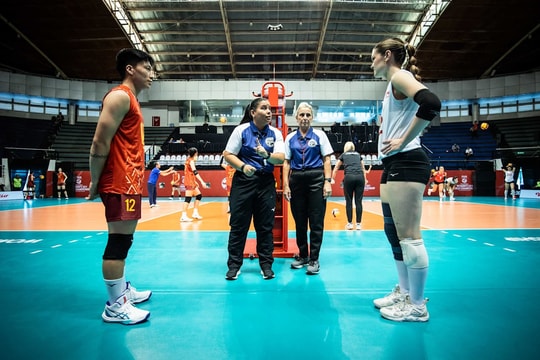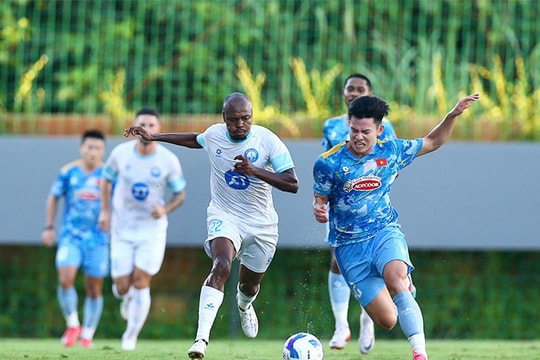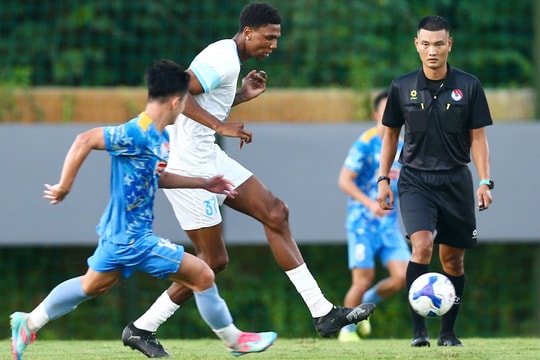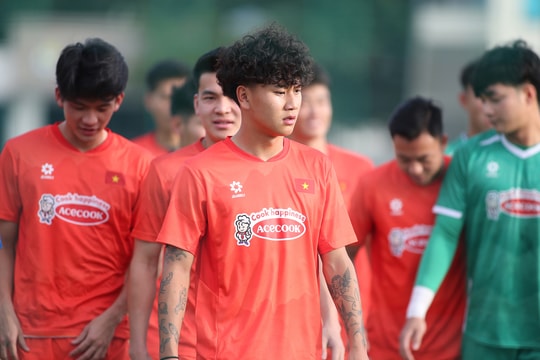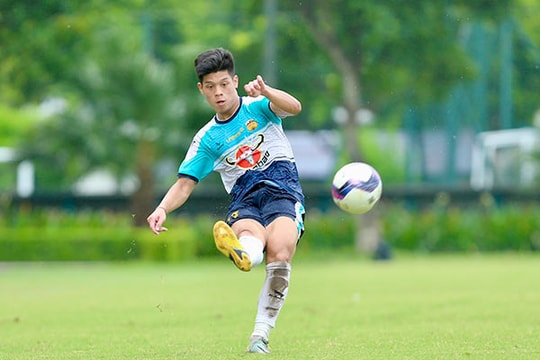Roberto Baggio's Birthday: 50th Anniversary of a Genius
For the people of Caldogno, Northern Italy, Roberto Baggio is just one of the people who lives there, not a legend of calcio, who brings so many emotions with his goals, his stories and his ponytail fluttering on the field. More than that, he is a strange person. He lives there, but he does not exist. He has been hidden in his villa for many years.
» Priest Nguyen Dinh Thuc incited parishioners
At the age of 50, many football legends have become big names in the world of coaches, won many more achievements in their new positions and continued to make great contributions to the round ball. But Roberto Baggio is different. He distanced himself from everything related to football, not involved in the green grass in any aspect. He did not coach, did not take on any management position, did not appear in talk shows or give interviews in the press, did not meet fans, and even maintained a very reserved and closed attitude every time he had to leave the house. He avoided everything and carefully selected the events he could participate in, even though there were many invitations. The answer was usually "No" (no) rather than "Sì" (Yes). He existed as if it were a breeze in the sky.
Baggio still exists but is absent from the world, and since May 16, 2004, the day he played his last match as a player, he disappeared into thin air, leaving almost no trace.
All we know and remember about him are memories that still seem fresh, vivid and pounding like the heart in his chest, the goals he scored for the Azzurri and his clubs, the injuries, pain and criticism he endured throughout his playing career, the arguments with coaches about the seemingly demonized number 10 position in a tight and tactical football like Italy.
The last films made about him were published seven years ago, in a 10-disc set about his life and career. Every year, the Gazzetta dello Sport newspaper and the RAI television station reprint the set and it always sells out.
Many generations of tifosi who watched him play still live with memories of him. Younger tifosi mention him, because they no longer see in calcio young talents and players who can move them.
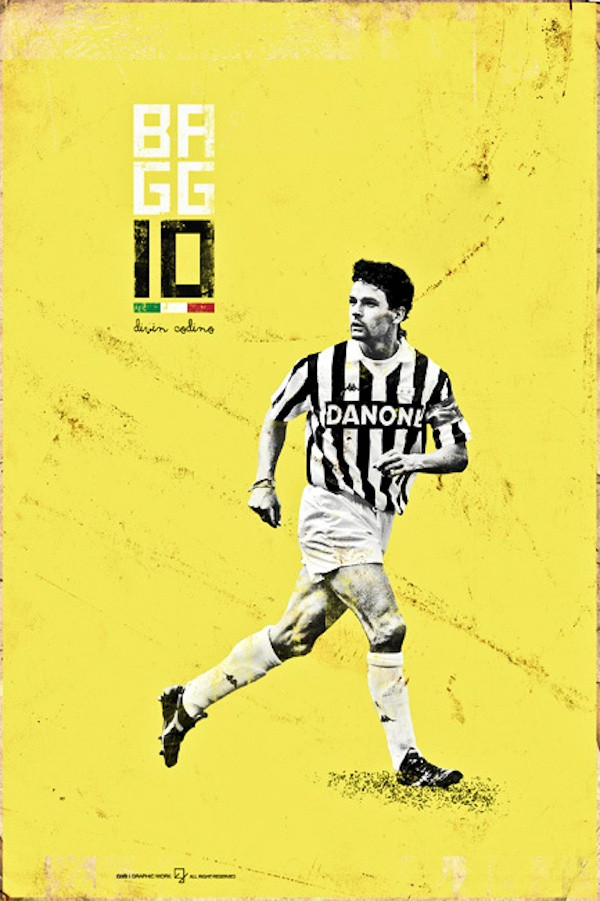 |
| Roberto Baggio in Juventus colours. Painting by Giuseppe Vecchio |
What is Roberto Baggio in world football, a legend of football before Messi, an Italian player who won the Ballon d'Or in 1993, the only Italian striker to have scored in three consecutive World Cups (1990, 1994, 1998), who bowed his head on the penalty spot on a hot afternoon in Pasadena, in the final against Brazil?
He is everything, victory and defeat, happiness after goals and also pain from injuries, from failures, from being doubted and rejected, because the peaks of glory reached were always followed by troubles related to his playing position and his personality.
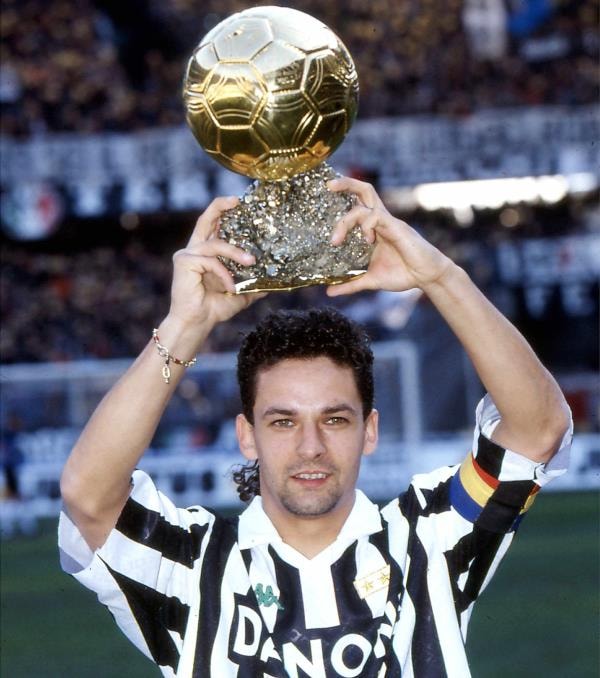 |
| Baggio and the Ballon d'Or title he won. |
The most beloved player by the fans is always the one who is either abandoned by the national team coaches and big clubs or used in their own way, preventing him from fully developing his talent. Then, after he retires from the field, people remember him with endless regret for a number 10 who will no longer appear.
An Italian friend of mine once mentioned something else. He said that Baggio played in a time when Italian football was full of big names. And coaches, who needed results and consistency above all, were reluctant to use him, a true artist who could hardly guarantee them these qualities, despite the fact that he scored many goals.
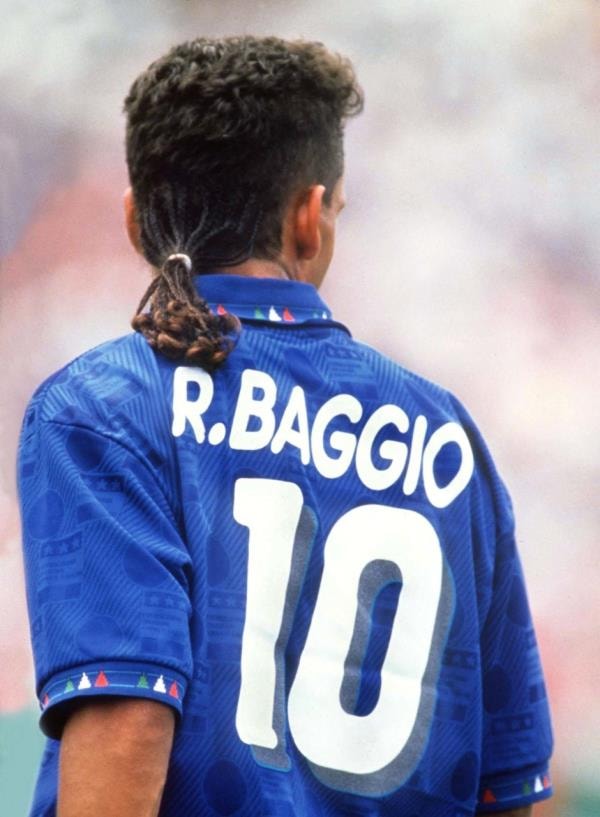 |
| After Baggio retired from the field, people remembered him with endless regret about a number 10 who would no longer appear. |
It was Italian football that killed him and the generation of number 10s like him, making the remaining number 10s like Totti rare and without successors, and other real number 10s, in order to survive, had to drop 20 meters below, playing on the defensive line like Pirlo.
A famous Italian football commentator believes that when Baggio's great talent exploded at the age of 22, with a drunken dribble of dozens of meters through the Czechoslovakian defense and a shot into the Central European team's net to score one of the most beautiful goals in World Cup history at Italia 90, the miracles he brought to Italian football and the world also began to be killed, not by him, but by a great revolution taking place at that time in calcio.
Arrigo Sacchi killed the sleepy concrete football of Italian football and adopted a high pressing and zonal defense in a 4-4-2 formation to create a Milan that won every game. The revolution that later spread throughout Italian football also eliminated Baggio.
The truth is that when Sacchi became the head coach of the Italian national team, Baggio was still used, even being his savior and the Azzurri at the 94 World Cup, but outside the tifosi, no coach knew or dared to use him in the wonderful way he could bring. Sacchi even had a conflict with Baggio.
But ironically, the failure of the Italian team in the 1994 World Cup final was put entirely on his shoulders. People always forget that, before him and after him, Baresi and Massaro had missed decisive penalties. They only remember him, the penalty that went over the bar and the head bowed low, in pain, helpless, silent.
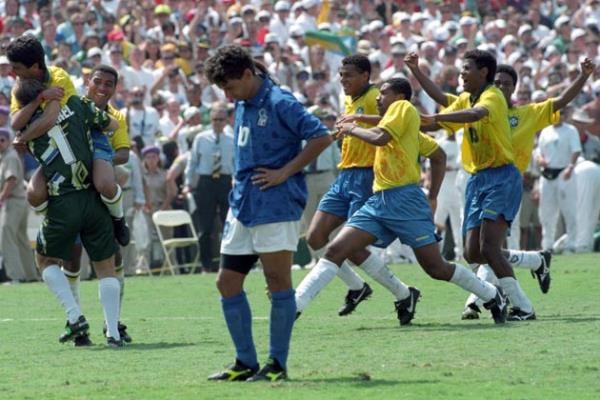 |
| Italy's failure in the 1994 World Cup final was entirely blamed on Baggio. |
He became a man lost in the times, because in those early years of the 1990s, world football was in the midst of major tactical revolutions that would have a major impact on the future. The big teams he played for were all in a transitional period, both generationally and tactically.
At Juventus, Gigi Maifredi used him as a second striker, which failed and he left. Trapattoni played him wider, more creatively, but he also left, after the year he won the Ballon d'Or (1993), with the only title he won that year being the UEFA Cup (in football today, can any player win the Ballon d'Or with just a Europa League title?).
Lippi arrived at Juve when a new genius named Del Piero appeared and Baggio was left out. He arrived at Milan when Capello had no shortage of stars in attack. He still scored goals, still brought joy to the fans, still won the Scudetto in red and black, but he was never considered the main "actor".
It was the same at Inter. Still scoring, still contributing, but he couldn't help Inter reach the top and he fell into confrontations with Lippi. After all, he could only be a big star at provincial teams like Bologna or Brescia. That seemed to be his destiny.
What is Roberto to us? For the late Juventus president Gianni Agnelli, who signed him from Fiorentina, he was the “divin codino” (divin codino), as he once called him. For Michel Platini, a legend of Juve and world football, he was a number 9 and a half. For the late famous journalist Gianni Brera, he was a deer gliding across the field. For the singer Tiziano Ferro, Baggio was “the man no one wanted to save. They congratulated him as a champion. But they insulted him for a penalty”, as in the words of the ballad “Alla mia èta” (At my age).
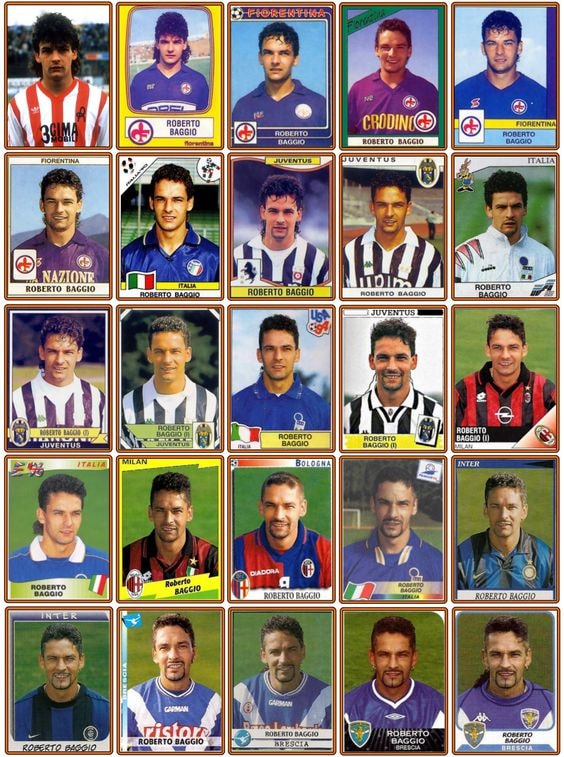 |
| Roberto Baggio's club career through the years. |
Until now, no one has forgotten his sad smile and eyes on the day he left the field. Before the match, he only said, "I have devoted everything to football. Now, I am a family man." He did not return to football, even though the Italian Football Federation wanted him to take on the position of youth training director.
That position is not for you, not suitable for someone like you, a person who is undiplomatic and too quiet, a person who has given up everything to return to family life, has done everything to fill the emotional void he has caused his wife and children.
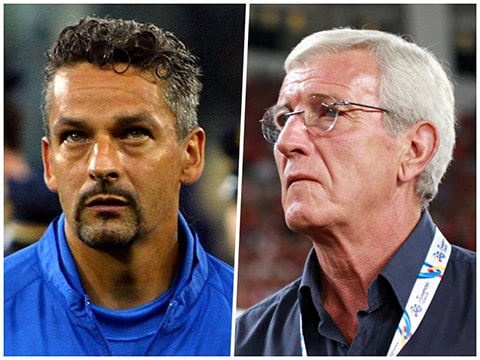 |
| Roberto Baggio - Marcello Lippi: The classic feud between two Italian football geniuses. |
He still said that when his children Valentina and Mattia were born in 1990 and 1994, he was not present with his wife on the day she gave birth. So he retired and only a year later his wish was fulfilled: his third child, Leonardo, was born in 2005, when he no longer missed anything on the football field.
He also stopped watching football, except for a few games of his beloved Boca Juniors. Cesare Cremonini once sang that, “since Baggio stopped playing, Sundays on the Italian pitch are boring.”
What can we do now, when the pages of the book have closed, when the 11 meter gap to happiness turned into unhappiness in the final match of the 94 World Cup is forever a pain not only for him, but also for a generation. Even the Golden Cup won on a Berlin night in the summer of 2006 could not ease that pain.
At 50, what is Baggio really? We can ask, but only he has the answer. And in fact, he does not want to appear in public to do so. He still scores his own goals, in new fields, and brings happiness to himself and many others.
Seven years ago, he was awarded the World Peace Award, becoming the first player in the world to be honored as a man of peace, for his contributions to protecting human rights…
According to TT&VH
| RELATED NEWS |
|---|

